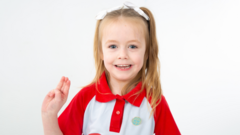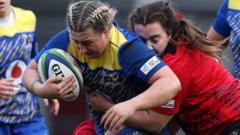Can Photography Transform Attitudes Toward Autism?

Published: 2025-08-24 21:00:23 | Category: wales
This article explores a remarkable photography exhibition created by autistic children and teenagers from South Wales, aiming to challenge and change negative perceptions surrounding autism. Titled "But you don't look autistic," the exhibition showcases portraits of neurodivergent individuals, highlighting their experiences and the need for positive representation in society.
Last updated: 12 October 2023 (BST)
Understanding the Exhibition: A Step Towards Change
The "But you don't look autistic" exhibition invites audiences to rethink their assumptions about autism. Through the eyes of its young creators, it offers personal narratives and portraits that reveal the complexities of being neurodivergent. This initiative is not just about showcasing art; it's about fostering understanding and acceptance.
Key Takeaways
- The exhibition aims to combat negative stereotypes surrounding autism.
- Participants include neurodivergent children and adults from South Wales.
- Personal stories reveal the challenges faced by autistic individuals.
- Support from charities is crucial in empowering neurodivergent youth.
- The exhibition seeks to provide positive representation of autism in society.
What Inspired the Exhibition?
The idea for this impactful exhibition originated from a conversation between Jade West, a representative from Rewild Play, and her daughter. Jade recognised a significant gap in positive representation of autistic individuals. Both she and her daughter shared experiences that highlighted the misconceptions often associated with autism, leading to the desire to create a platform for neurodivergent voices.
Voices from the Exhibition: Liam and Mackenzie
Fifteen-year-old Liam expressed pride in having his portrait included in the exhibition. He shared his frustration with how people perceive him when he discloses his autism. "A lot of the time, they just speak to you as if you're not as smart as them," he explained, highlighting the condescension often faced by autistic individuals.
Liam is currently awaiting an official diagnosis but has been informed by professionals that he displays traits of both autism and attention deficit hyperactivity disorder (ADHD). His involvement in the exhibition has been a step towards embracing his identity. "The support I received from the charity helped me accept the fact that I'm autistic," he noted.
Similarly, sixteen-year-old Mackenzie shared his journey, stating that his participation in the exhibition allowed him to explore various aspects of autism. Diagnosed at the age of eight, he has also faced negative attitudes. "It's really annoying when people kind of treat you as if you're a little bit less," he remarked, shedding light on the everyday challenges that autistic individuals encounter.
Breaking Down Misconceptions
The exhibition aims to dismantle stereotypes that often mischaracterise autism. Jade West, who was diagnosed with ADHD at 42 and is awaiting an autism diagnosis, understands these misconceptions firsthand. She stated, "I still don't voluntarily offer up the information because I'm going to get judged." This highlights the stigma that continues to exist around neurodivergent conditions.
Jade's photograph in the exhibition serves as a powerful reminder that autistic individuals can lead fulfilling lives, defying the stereotypes that often label them as incapable. "Maybe there's a part of me that wanted the positive representation for myself," she admitted, reflecting the need for change in societal perceptions.
The Impact of Support Networks
Support from organisations like Rewild Play plays a crucial role in empowering neurodivergent children and young people. These charities provide safe spaces for self-expression, community engagement, and personal growth. The exhibition is a testament to the transformative power of support, allowing these young individuals to share their stories and experiences.
How Charities Like Rewild Play Make a Difference
- Offer workshops that encourage creativity and self-expression.
- Provide mentorship and guidance to neurodivergent youth.
- Create platforms for sharing personal narratives and experiences.
- Foster community connections that promote understanding and acceptance.
What Happens Next?
The exhibition is not just a standalone event; it represents a movement towards greater understanding and acceptance of neurodiversity. As the project gains visibility, it has the potential to inspire similar initiatives across the UK, encouraging other communities to challenge stereotypes and foster inclusivity.
Furthermore, the participation of young individuals like Liam and Mackenzie provides a unique perspective that can help shape future conversations about autism. Their voices are vital in advocating for a society that embraces diversity in all its forms.
Conclusion: A Call to Action
As society continues to evolve, it is essential to challenge outdated perceptions of autism and embrace the richness that neurodiversity brings. The "But you don't look autistic" exhibition is a significant step in this direction, showcasing the talents and insights of autistic individuals. By supporting such initiatives and spreading awareness, we can collectively work towards a more inclusive future.
How can we each play a part in changing perceptions of autism in our communities? Let's reflect on our own biases and commit to fostering understanding and acceptance. #Neurodiversity #AutismAwareness #PositiveRepresentation
FAQs
What is the "But you don't look autistic" exhibition about?
The exhibition showcases portraits of neurodivergent children and adults from South Wales, aiming to challenge negative stereotypes and promote positive representation of autism.
Who organised the exhibition?
The exhibition was organised by Rewild Play, a charity based in Newport, which supports neurodivergent children and young people in their self-expression and personal growth.
Why is positive representation important for autistic individuals?
Positive representation helps combat stereotypes, fosters understanding, and encourages acceptance within society, allowing autistic individuals to feel valued and included.
How can I support neurodivergent individuals in my community?
You can support neurodivergent individuals by advocating for inclusivity, volunteering with local charities, and educating yourself and others about neurodiversity and its value.
What challenges do autistic individuals face in society?
Many autistic individuals face misconceptions, stigma, and negative attitudes that can lead to feelings of isolation and inadequacy. Challenging these views is essential for fostering acceptance.



